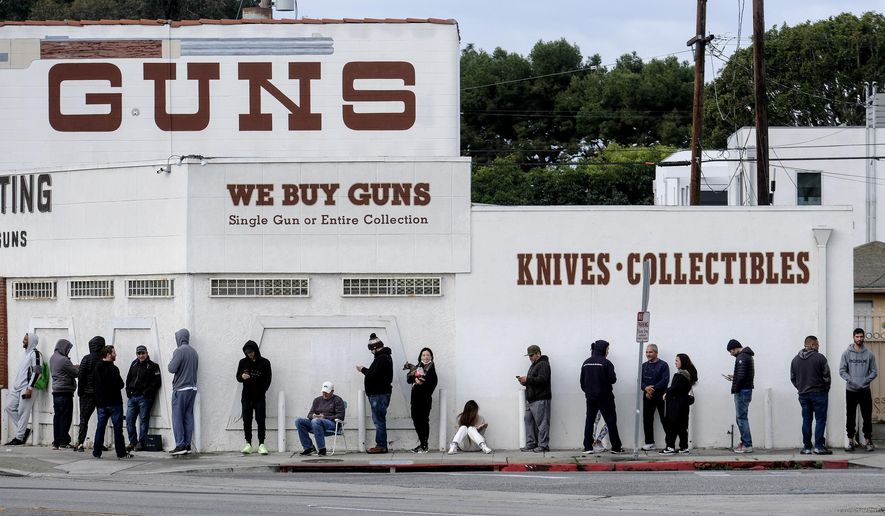Nearly 4.7 million gun background checks were run through the FBI’s national instant check system in March, the highest monthly total in the more than 20 years since the system was created.
The number jumped as President Biden and Congress started to weigh new controls and stricter background checks after shootings in California, Colorado and Georgia.
The 4.7 million checks broke the record of 4.3 million in January and marked a 25% increase from a then-record 3.7 million checks in March 2020, when there was a run on firearms as the scope of the COVID-19 pandemic was becoming clearer.
The checks aren’t a one-to-one correlation with gun sales, but they are used as a general approximation for the health of the market.
Larry Hyatt, owner of Hyatt Guns in North Carolina, said he saw a bit of a drop-off in February and part of March after what had been a steady stream of demand over the previous year.
“But then they started talking about the gun control bills coming in, and we saw a quick increase,” he said.
Mr. Hyatt suggested that some customers have been using their stimulus checks from the most recent round of federal coronavirus relief to buy guns.
“And then the government sent all the money to buy the guns, so we’ve had a huge surge for the last two weeks,” he said. “When the stimulus money started hitting and they started talking about making it more difficult to buy a firearm, we definitely saw a big increase in our internet and in-store sales.”
Mr. Hyatt said he is still dealing with supply shortages of ammunition and certain powders and primers.
“Right now, gun sales are suppressed because of lack of inventory is probably the main problem,” he said. “Demand is higher than supply right now.”
Mark Oliva, a spokesman for the National Shooting Sports Foundation, said he hasn’t heard of any additional supply chain issues stemming from the container ship that was stuck in the Suez Canal until Monday.
The March totals continued a recent stretch of year-over-year monthly increases of checks run through the National Instant Criminal Background Check System.
Gun sales soared last year as people rushed to stock up during the COVID-19 pandemic. Sales also increased in 2019 as Democratic presidential primary candidates were calling for far-reaching measures such as an Australian-style gun ban and buyback programs.
Vice President Kamala Harris, then a presidential candidate, said in May 2019 that she planned to ban imports of AR-15-style semi-automatic weapons if elected to the White House.
The Democratic-led House passed legislation last month to tighten gun-purchase background checks, though the bills are unlikely to secure the 60 votes needed to break a filibuster in the 50-50 Senate.
Nevertheless, Senate Majority Leader Charles E. Schumer, New York Democrat, has vowed to put background check legislation on the floor for a vote.
President Biden has talked about taking executive action on guns, which could include regulations on firearms built from 3D-printed parts.
Mr. Oliva said it’s clear that calls to ban popular firearms such as the AR-15 are influencing gun sales.
“Americans continue to vote with their wallets when it comes to lawful firearm ownership,” he said.
Mr. Oliva’s group estimated that, after adjusting for permit checks and other checks that don’t correlate to gun sales, last month’s figure is probably the second-highest March total behind last year.
Jurgen Brauer, an industry analyst, likewise estimated that the March total for gun sales, nearly 2.2 million, was the second-highest March on record, behind last year’s 2.6 million.
“However, for the first quarter of 2021 as a whole, about 5.9 million firearms were sold as opposed to 5.2 million in the first quarter of 2020,” said Mr. Brauer, chief economist at Small Arms Analytics & Forecasting. “If this rate of sales were to be sustained throughout 2021, last year’s record sales of 22.8 million would be broken.”
Democrats have re-upped their calls for action on guns after the recent mass shootings in Colorado and Georgia that left 18 people dead. A shooting in California on Wednesday killed at least four people.
White House press secretary Jen Psaki said Thursday that staffers are reviewing what executive actions Mr. Biden can take.
“[It’s] something that he is certainly personally committed to, and hopefully we’ll have more to say on that soon,” she said.
Ms. Psaki touted the $5 billion Mr. Biden included for community violence intervention efforts in the $2.25 trillion infrastructure package that the president announced Wednesday.
Sen. Christopher Murphy, Connecticut Democrat, said this week that he has been on the phone with Senate Republicans to try to find a path forward on legislation.
“There’s no reason why we shouldn’t be able to find 60 votes for a measure that expands background checks, but it’s going to take a lot of work,” said Mr. Murphy, who has been a leading advocate for stricter gun laws since the 2012 Sandy Hook school shooting. “We have work to do, but I am committed to getting a strong bill expanding background checks passed through the Senate, come hell or high water.”
President Trump’s Justice Department moved unilaterally to effectively ban bump stocks, which attach to semi-automatic rifles to mimic the rate of machine gun fire.
Gun rights groups sued, and the 6th U.S. Circuit Court of Appeals ruled last week that the ban was likely illegal, illustrating the potential limitations and perils of Mr. Biden’s actions without Congress.
Bump stocks gained attention after a gunman in Las Vegas used the devices to rain fire on concertgoers in October 2017 in a shooting that left more than 50 people dead.
• David Sherfinski can be reached at dsherfinski@washingtontimes.com.




Please read our comment policy before commenting.